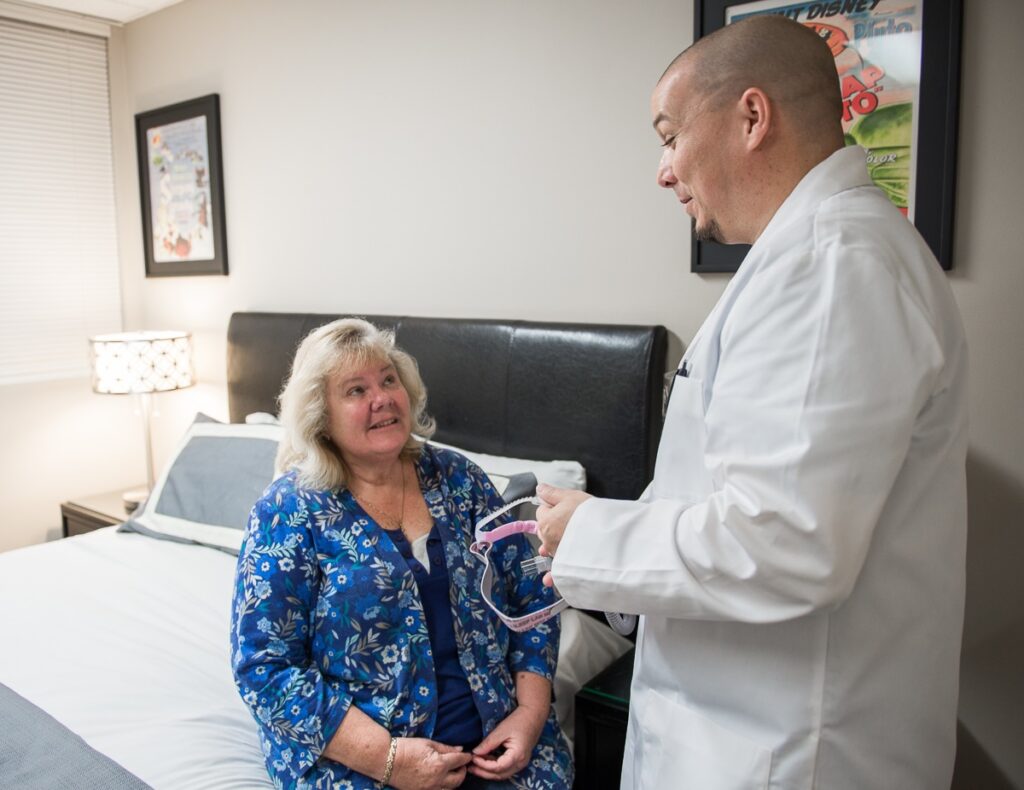The best method of diagnosis is an in-lab study. In order to ensure the best outcome of the testing process, we provide a safe and supportive environment to minimize any potential anxiety for you. We provide you with one of our comfortable, private bedrooms for your overnight study. Our state of the art monitoring equipment will monitor brain waves, heart rate, muscle activity, breathing and snoring. We will also monitor the level of oxygen in your blood and the movement of your chest and abdomen.
The monitoring equipment is painless and most people do not find it uncomfortable or an obstacle to falling asleep. A qualified sleep technologist will carefully set you up, explain the procedures and monitor you closely throughout the study. The technical equipment and staff are housed in a separate area from your sleep room so you are not disturbed.

A Polysomnogram, known as PSG, serves as a diagnostic sleep study, often referred to as a Baseline sleep study. Its primary purpose is to monitor various physiological parameters during sleep, including breathing, heart rate, oxygen levels, brain activity, muscle activity, and other sleep-related activities. Typically, this study does not involve any form of therapy and is utilized by physicians to diagnose sleep disorders based on observed abnormalities.
A Split Night Study is a comprehensive sleep study that combines the Polysomnogram and CPAP Titration into a single night. The initial portion of the study focuses on diagnosis. If specific criteria, such as a significant level of sleep apnea, are met during this phase, a CPAP titration is initiated after a few hours of sleep. However, if the criteria are not met, CPAP therapy may not be started, and the study will proceed solely as a Polysomnogram.
ASV (auto-servo ventilation) titration is an advanced treatment option for patients with Complex or Central Sleep Apnea. Typically, this therapy is employed after other treatment methods have proven ineffective. ASV titration necessitates the use of an advanced titration machine.
During the day, MWT (maintenance of wakefulness test) is administered to evaluate a patient’s daytime alertness level. The test involves placing the patient in a quiet, dimly lit room at scheduled intervals and instructing them to remain awake for a predetermined duration.
A CPAP (continuous positive airway pressure) titration closely resembles a Polysomnogram and involves many of the same monitoring sensors. The study commences with the application of CPAP therapy, and a sleep technologist will oversee the patient throughout the night. They will progressively adjust and increase the CPAP settings to determine the optimal level that eliminates sleep apnea. CPAP therapy is administered by placing a small mask over the nose or mouth, connected via a flexible hose to the CPAP machine. The machine gently delivers a stream of air into the airway, ensuring unobstructed breathing.
BiPAP (bilevel positive airway pressure) is similar to CPAP but has two pressure settings instead of just one like CPAP. BiPAP provides a higher pressure during inhalation and a lower pressure during exhalation. Having two pressures can sometimes make it easier to breath with therapy, especially when high pressures are required to eliminate sleep apnea. BiPAP can also be used to treat Central Sleep Apnea, helping to encourage breathing during central apnea events.
MSLT (multiple sleep latency tests) are employed to assess daytime sleepiness and screen for narcolepsy. Typically, these tests are conducted during the day, following a nighttime Polysomnogram. Patients stay at the laboratory and take scheduled naps at regular intervals throughout the day.
We are an in-network provider for every major insurance carrier. This means that our services are covered by your insurance plan, helping you access the care you need without the burden of high out-of-pocket costs.
"Our accreditation with the Accreditation Commission for Health Care (ACHC) is of utmost importance, both to us and to you. It signifies our commitment to meeting, upholding, and enhancing the standards set by ACHC. This accreditation is a testament to our ongoing adherence to these high standards, and it necessitates regular on-site inspections every 3 years for maintenance.
Since 2004, Los Angeles Sleep Study Institute has been diagnosing and treating patients with sleep disorders throughout Los Angeles and Ventura counties. We accept all major medical insurances, including Blue Cross, Blue Shield, and Medicare.